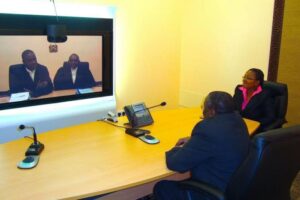The Judiciary is one arm of the government that has embraced Information and Communication Technology (ICT) to deliver services during these times of coronavirus pandemic.
In ensuring that the wheels of justice do not come to a halt, courts have facilitated electronic filing of cases in a method referred to as Electronic Case Management and the hearing of parties through video links. This is in efforts to restrict human contact and curb the spread deadly COVID-19 disease.
COVID-19: Where Are ICU Beds Donated By H.E. Margaret Kenyatta?
But onnly cases that are certified urgent are being heard virtually through Skype and Zoom then orders sent to the applicants via email. Hearing and mention of criminal and civil cases have been suspended till further notice’
The President of Law Society of Kenya (LSK) Nelson Havi explains that the registrar looks at the case to decide if it is urgent or not. Only urgent matters are forwarded to the judge, who hears it and makes an order ex parte, but if there is a need for an inter partes hearing, the judge will give a date when the case will be heard via Zoom or Skype.

But City Lawyer George Ogembo points that challenges in filing documents electronically is that some pleadings may end up missing or may not be captured in one’s record since all court users rely on one email.
“You must careful to ensure the voluminous documents reach the deputy registrar and there are also challenges of delay when sending huge documents which may take long,” Mr Ogembo said.
He added that one must call the registrar before sending documents and notify him or her that you are mailing the documents and call again to confirm if they have been received.
Mr Ogembo points that the registrars will be overwhelmed by screening and checking the multiple documents sent by different people as some will also be sent without notifications.
LSK boss Mr Havi praised technology for ensuring that the Judiciary is not shut down adding that COVID-19 pandemic is providing solutions to problems that have bogged down quick delivery of justice.
“COVID-19 has given the Judiciary and lawyers an opportunity to be innovative. Courts have put a digital platform where cases can be heard and taken to the judge, decisions made and communicated to advocates through email or WhatsApp. That is a mojor step in delivery of justice” Havi said.
https://www.standardmedia.co.ke/article/2001365060/it-s-blurred-vision-in-bid-for-virtual-court
The new LSK president on Friday argued an application that is challenging the constitutionality of the current dusk-to-dawn curfew through Zoom where he said that parties involved in a case can see each other on the display screen, painting a slim difference between virtual and traditional courts.
In the curfew case presided by Justice Weldon Korir, Zoom timed out almost three times posing a challenge that pushed one case to nearly three hours.
Havi argues that such challenges are the teething problems to any new idea and can surmounted with time but he describes the new model of litigation as exciting and fulfilling because parties argue cases from the confines of their homes or office.
He however pointed that the technology is timely but costly as he advised the Judiciary to purchase an entire month’s subscription to Zoom as he called on lawyers to treat virtual courts with respect and observe time. Some lawyers log in five or ten minutes into the session.
This is because many lawyers still see the digital system as a disruption that will overhaul the legal practice.
“COVID-19 pandemic has taken the legal practice to a new horizon that may necessitate review of the Advocates Remuneration Order so that teleconferencing and receiving rulings are captured as a court appearance,” lawyer Wahome Gikonyo said.
He also urged legal practitioners and judicial officers to learn through tutorials to fully get acquinted with the technology.





















